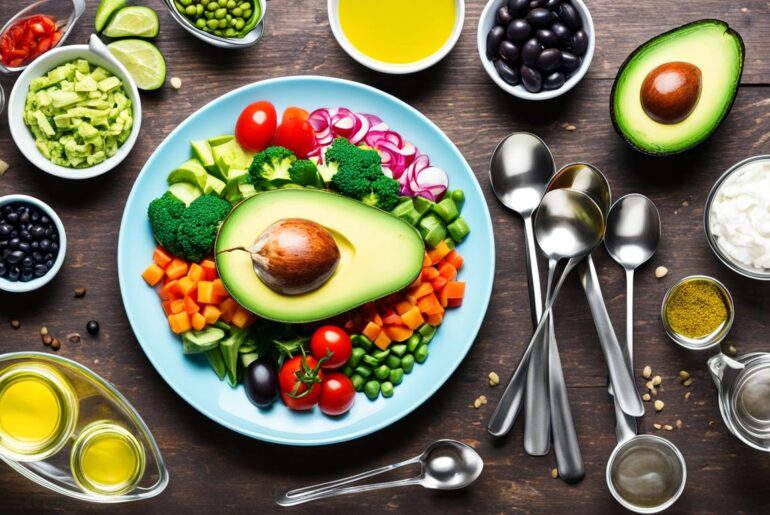When it comes to the ketogenic diet, many people focus on its weight loss benefits. However, what you may not know is that it is possible to build and maintain muscle mass on a keto diet. In this article, I will provide you with expert tips and strategies for maintaining muscle mass while following a ketogenic diet.
The ketogenic diet is a low carb, high fat diet that induces a state of ketosis in the body. It involves drastically reducing carb intake and replacing it with healthy fats. While this may initially raise concerns about muscle loss, research has shown that it is indeed possible to build and preserve muscle on a keto diet.
One important aspect of keto muscle building is ensuring an adequate calorie intake. It is crucial to consume more calories than you burn in order to support muscle growth. This can be achieved by consuming high-protein foods, which are essential for muscle repair and growth.
Another key consideration is optimizing your nutrient intake. While carb intake is limited on a keto diet, it is important to consume some carbs for fuel, especially around workouts. Additionally, healthy fats should make up the remaining calories, as they are the primary source of fuel on a ketogenic diet.
Along with proper nutrition, regular resistance training is crucial for muscle maintenance and growth on a keto diet. Resistance training stimulates muscle fibers and helps prevent muscle loss. Incorporating exercises such as weightlifting, bodyweight exercises, and resistance band workouts into your routine can effectively promote muscle retention.
To enhance your muscle-building journey on a keto diet, supplements can provide valuable support. Protein powders and creatine are popular choices among athletes and fitness enthusiasts for promoting muscle growth and recovery.
Lastly, it is important to be aware of potential side effects and to track your carb intake to ensure that you achieve and maintain ketosis. This can be done through carb tracking apps or by consulting with a healthcare professional.
In conclusion, while the ketogenic diet is primarily known for its weight loss benefits, it is indeed possible to maintain and build muscle mass on a keto diet. By following a well-rounded approach that includes proper nutrition, regular resistance training, and consideration of supplements and carb intake, you can achieve your muscle-building goals while following a ketogenic diet.
Understanding the Keto Diet for Muscle Maintenance
The keto diet is a popular eating plan that involves drastically reducing carb intake and increasing fat intake. This dietary approach aims to induce a state called ketosis, where the body primarily uses ketones, produced from fat, as fuel instead of glucose.
While the keto diet is typically associated with weight loss, it offers a range of other benefits as well. These include improved epilepsy control, better blood sugar regulation, and potential risk reduction for chronic conditions like Parkinson's disease and Alzheimer's disease.
Reducing carb intake forces the body to enter ketosis, a metabolic state that can have profound effects on overall health and well-being. By restricting carbohydrate intake to a very low level, typically around 20-50 grams per day, the body is forced to transition from using glucose as its main energy source to using ketones derived from fat breakdown.
Keto Diet Tip: In order to achieve ketosis, it is essential to monitor and restrict carb intake. This means avoiding or significantly reducing foods such as grains, sugar, starchy vegetables, and most fruits.
When the body is in ketosis, it undergoes a variety of metabolic changes. Insulin levels decrease, promoting fat burning for fuel, which can lead to weight loss. Additionally, ketones are known to have appetite-suppressing effects, further contributing to weight management.
The Role of Fat Intake on the Keto Diet
Fat intake plays a crucial role in the keto diet. Since carbs are limited, fat becomes the primary macronutrient source in this eating plan. Consuming adequate fat is essential to meet energy needs and support various bodily functions.
It is important to note that not all fats are created equal. While the keto diet encourages high fat intake, it is advisable to focus on healthy fats such as avocados, olive oil, nuts, and seeds, while limiting or avoiding unhealthy fats like processed oils, trans fats, and fried foods.
Keto Diet Tip: Remember to choose quality fats and prioritize nutrient-dense sources. This will help ensure you reap the full benefits of the keto diet while meeting your body's nutritional requirements.
The Relationship Between Carb Intake and Ketosis
Carbohydrate intake is a critical factor in achieving and maintaining ketosis. The goal is to limit carb consumption to a threshold that promotes ketone production without compromising overall health and well-being.
The exact carb intake required to enter and sustain ketosis may vary from person to person. However, most individuals following the keto diet aim for a daily carb intake between 20-50 grams. This range is generally low enough to trigger ketosis but allows for flexibility in food choices.
Other Benefits of the Keto Diet
In addition to its weight loss effects, the keto diet offers several other potential benefits:
- Improved blood sugar control: By reducing carb intake, the keto diet can help stabilize blood sugar levels, potentially benefiting individuals with diabetes or prediabetes.
- Reduced inflammation: Some studies suggest that the keto diet may have anti-inflammatory effects, possibly reducing the risk of chronic conditions like heart disease and certain cancers.
- Enhanced mental clarity: Ketones produced during ketosis are an alternative energy source for the brain and may provide mental clarity and improved cognitive function.
- Increased energy levels: Many people report increased energy and improved endurance when following the keto diet.
| Benefits of the Keto Diet |
|---|
| Weight loss |
| Improved blood sugar control |
| Reduced inflammation |
| Enhanced mental clarity |
| Increased energy levels |
While the keto diet's primary focus is often on weight loss, it is important to recognize the array of potential benefits it can offer beyond shedding pounds. From improved blood sugar control to reduced inflammation and increased mental clarity, the keto diet has emerged as a versatile approach to overall health and well-being.
How to Build Muscle on a Keto Diet
Building muscle on a keto diet requires careful consideration of calorie intake, protein intake, carb intake, and fat intake. To build muscle, it is important to consume more calories than you burn, with a focus on consuming adequate protein to support muscle growth. While carb intake is limited on a keto diet, it is still important to consume some carbs for fuel, especially around workouts. Fat intake should make up the remaining calories, as fat is the primary source of fuel on a keto diet.
Let's break down each component:
Calorie Intake
When building muscle, it is crucial to consume an excess of calories to provide your body with the necessary energy for growth and repair. Aim for a calorie surplus of around 10-20% above your maintenance level.
Protein Intake
Protein is the building block of muscle tissue and is essential for muscle growth. Aim to consume 1.2-2 grams of protein per kilogram of body weight per day. Good sources of protein on a keto diet include meat, poultry, fish, eggs, and low-carb dairy products.
Carb Intake
While carb intake is limited on a keto diet, it is still important to consume some carbs for fuel, particularly around workouts. Consuming 20-50 grams of carbs before or after exercise can help replenish glycogen stores and support muscle recovery.
Fat Intake
Fat is the primary source of fuel on a keto diet. It should make up the remaining calories in your daily intake. Healthy sources of fat include avocados, nuts, seeds, olive oil, and coconut oil.
By balancing calorie intake, consuming adequate protein, including some carbs strategically, and prioritizing healthy fats, you can effectively build muscle on a keto diet.
Factors to Consider for Muscle Maintenance on a Keto Diet
In addition to following a proper diet, several factors are crucial for effectively maintaining and growing muscle on a keto diet. These include:
1. Resistance Training
Regular resistance training plays a pivotal role in building and preserving muscle mass. Engaging in activities such as weightlifting and bodyweight exercises stimulates muscle fibers, leading to growth and improvement. It is recommended to incorporate resistance training into your workout routine at least two to three times per week.
2. Supplements
Supplements can be beneficial in supporting muscle growth on a keto diet. Protein powders, such as whey or plant-based options, provide an easily digestible and convenient source of high-quality protein. Creatine is another popular supplement that has been shown to enhance muscle strength and power. However, it's essential to consult with a healthcare professional before adding any new supplement to your routine.
3. Sleep
Getting sufficient sleep is crucial for overall muscle gain and exercise performance. During sleep, the body repairs and rebuilds damaged muscle tissues, allowing them to grow and become stronger. Aim for seven to nine hours of quality sleep each night to promote muscle recovery and maximize your training results.
4. Side Effects
Although the keto diet can have numerous benefits, it is important to be aware of potential side effects. These may include fatigue, irritability, and difficulty concentrating, especially during the initial stages of transitioning into ketosis. If you experience severe or persistent side effects, it is advisable to consult with a healthcare professional.
5. Carb Tracking
Tracking your carbohydrate intake is vital to ensure that you stay in ketosis, the metabolic state essential for a keto diet's effectiveness. Keeping a record of your daily carb consumption can help you make informed decisions about your dietary choices and maintain the desired level of ketosis for muscle maintenance and fat burning.
By considering these factors alongside a well-balanced keto diet, you can optimize your muscle maintenance efforts and achieve your desired fitness goals.
![]()
Conclusion
In conclusion, the keto diet provides a viable path to achieving and maintaining muscle mass when approached with careful consideration. Through proper nutrition and the incorporation of regular resistance training, individuals can effectively build muscle on a keto diet. However, certain considerations should be taken into account to optimize results.
First and foremost, protein intake plays a crucial role in muscle maintenance and growth. Consuming adequate amounts of protein helps provide the necessary building blocks for muscle synthesis.
Additionally, timing carbohydrate intake strategically can further support muscle development. While the keto diet restricts overall carbohydrate intake, consuming some carbs around workouts can provide the energy needed to perform optimally and facilitate muscle recovery.
Finally, considering the use of appropriate supplements can enhance muscle-building efforts. Protein powders and creatine, for example, have been shown to promote muscle growth and aid in workout performance.
With dedication, discipline, and these considerations in mind, individuals can achieve their muscle-building goals on a ketogenic diet. By balancing the macronutrient ratios, incorporating resistance training, and utilizing appropriate supplements, muscle maintenance and growth can thrive within the constraints of a keto lifestyle.
FAQ
Can you build muscle on a ketogenic diet?
Yes, it is possible to build and maintain muscle on a ketogenic diet. While the diet restricts carbs, which promote muscle growth, research shows that with the right approach, you can still achieve muscle-building goals on a keto diet.
How does the keto diet work for muscle maintenance?
The keto diet involves reducing carb intake and increasing fat intake to induce ketosis, where the body uses ketones as fuel instead of glucose. While primarily used for weight loss, the keto diet can also help with epilepsy control, blood sugar regulation, and potential risk reduction for chronic conditions like Parkinson's and Alzheimer's.
What should I consider to build muscle on a keto diet?
To build muscle, focus on consuming more calories than you burn, with adequate protein intake to support muscle growth. Although carbs are limited, it's important to consume some around workouts for fuel. Fat intake should make up the remaining calories as the primary source of fuel on a keto diet.
What other factors contribute to muscle maintenance on a keto diet?
Regular resistance training is essential for building and preserving muscle mass on a keto diet. Additionally, supplements such as protein powders and creatine can aid in muscle growth. Getting sufficient sleep is important for muscle gain and exercise performance. It's also crucial to track carb intake to ensure staying in ketosis and be aware of potential side effects.
Can muscle mass be maintained on a ketogenic diet?
Yes, with dedication and a well-rounded approach, it is possible to maintain muscle mass on a ketogenic diet. By following proper nutrition, incorporating regular resistance training, and considering factors like protein intake, carb timing, and supplements, individuals can sustain their muscle maintenance goals on a keto diet.




